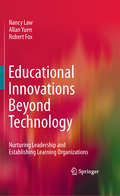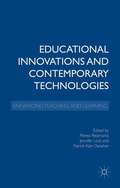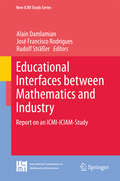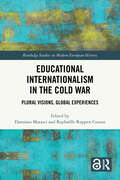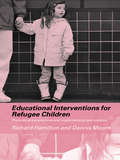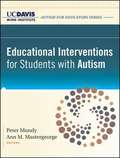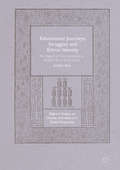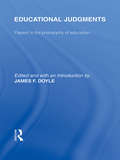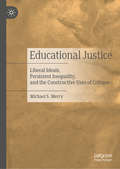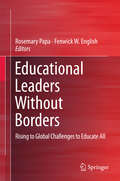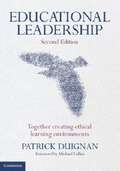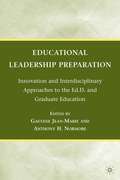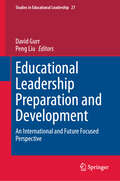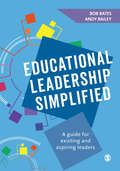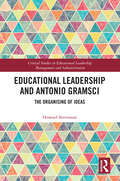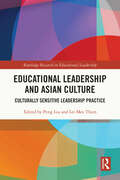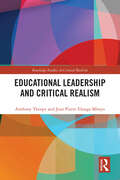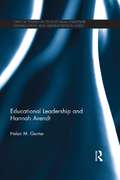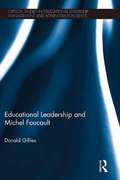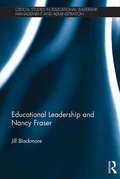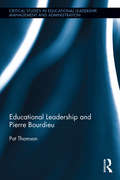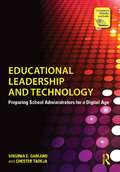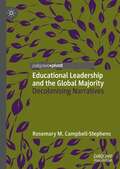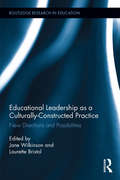- Table View
- List View
Educational Innovations Beyond Technology
by Robert Fox Allan Yuen Nancy LawThe text explores the concept of innovation, and analyse and compare different dimensions of innovation found in the various case studies; the transfer of innovation and the mechanisms of change; on an innovative online case study database on education innovations that has been designed to be used by education practitioners to support organizational leadership, international collaboration and reflective practice in the Asia Pacific Economic Cooperation (APEC) eEducation Leadership initiative; on a project aimed to support the establishment of communities of practice for education practitioners facilitated through an extendable online database that can be used to contribute and share case studies of their own ICT-supported pedagogical innovations. It discusses roles of the teacher and the anticipated changes to the education profession at a system level, in the coming decade on the basis of emerging changes observed in the case studies, and leadership issues at the school level. The book analyses change mechanisms for different kinds of innovation and how different contextual and cultural factors interact to bring about the changes observed.
Educational Innovations and Contemporary Technologies
by Patrick Alan Danaher Petrea Redmond Jennifer LockThrough careful selection of contemporary research, this volume demonstrates the different ways in which groups of learners as well as educators go about the complex task of innovatively designing and implementing technologies in education. The book explores a wide range of conceptual, disciplinary, methodological, national and sectoral boundaries and divides educational technologies into three key themes: specialised educational technologies; particular groups of learners; and teacher education. Current developments across Australia, Canada, Asia and the United States are all explained to illustrate the four central issues in innovation: policy and innovation; measuring innovation; sustaining innovation; and diffusing innovation. Throughout this book new understandings of the complex links between innovations and technologies are highlighted in multiple and highly varied educational settings.
Educational Interfaces between Mathematics and Industry
by Alain Damlamian José Francisco Rodrigues Rudolf SträßerThis book is the "Study Book" of ICMI-Study no. 20, which was run in cooperation with the International Congress on Industry and Applied Mathematics (ICIAM). The editors were the co-chairs of the study (Damlamian, Straesser) and the organiser of the Study Conference (Rodrigues). The text contains a comprehensive report on the findings of the Study Conference, original plenary presentations of the Study Conference, reports on the Working Groups and selected papers from all over world. This content was selected by the editors as especially pertinent to the study each individual chapter represents a significant contribution to current research.
Educational Internationalism in the Cold War: Plural Visions, Global Experiences (Routledge Studies in Modern European History)
by Damiano Matasci Raphaëlle Ruppen CoutazThis edited volume delves into the intricate landscape of educational internationalism during the Cold War, providing an in-depth examination of its diverse forms, impulses, and global impacts.Through multilingual archival research, the chapters uncover a variety of experiences that have fostered cross-border exchanges and cooperation within, between, and beyond the Western and Eastern blocs. Promoted by a wide range of individual and collective actors, internationalism in education has extended across a broad spectrum of fields, including academic mobility schemes, cultural interchanges, youth science competitions, development programs, and training courses. This collection offers, for the first time, a comprehensive analysis of these initiatives, revealing their intersections with national educational policies and processes of decolonization, development, and Europeanization. It also challenges conventional historical narratives by both uncovering forms of collaboration and solidarity that transcended the Iron Curtain and emphasizing the pivotal role of the Global South as a central arena of encounters.Educational Internationalism in the Cold War presents a rich understanding of the Cold War as a laboratory of contemporary globalization and is a valuable addition to the scholarship on one of the most critical moments of the twentieth century.
Educational Interventions for Refugee Children: Theoretical Perspectives and Implementing Best Practice
by Richard Hamilton Dennis MooreHow can schools best prepare themselves to successfully educate refugee children?By focusing on the education of refugee children, this book takes a rare look at a subject of increasing significance in current educational spheres. Highlighting the many difficulties facing refugee children, the editors draw upon a wealth of international experience and resources to present a broad, informative and sensitive text.Educational Interventions for Refugee Children identifies school-based interventions, whilst suggesting methods and measures with which to assess the efficacy of such programmes. It also develops a useful model that provides a standard for assessing refugee experience, offering diagnostic indicators for:* Evaluating support services for refugee children* Future avenues of research* Practical implications of creating supportive educational environments for refugee childrenThe need to identify and prepare for the education of refugee children is an international issue, and this is reflected in the broad outlook and appeal of this book. The editors have developed an overall model of refugee experience, integrating psychological, cultural and educational perspectives, which researchers, practitioners and policy makers in education will find invaluable.
Educational Interventions for Students with Autism
by Peter Mundy Ann M. MastergeorgeEducational Interventions for Students with Autism offers educators a vital resource for understanding and working with autistic students. Written by nationally acclaimed experts in the field and published in collaboration with the world-renowned UC Davis M. I. N. D. Institute, the book aims to deepen educators' appreciation of the challenges surrounding autism in a classroom setting and the current best practices in education for autism. To best meet the practical needs of teachers, school administrators, and parents, the book includes integrative summaries throughout, with recommendations for real-world classroom use. Topics covered include: how autism affects student learning, autism and its impact on schools, a teacher's view of autism and the classroom, best practices and challenges of working with students with ASD in the classroom,working with high-functioning autism (HFA) in schools, successful community-school partnerships, options for teacher training, and more.
Educational Journeys, Struggles and Ethnic Identity
by Xinyi WuThis book examines how state schooling in China has economically, culturally, and ideologically had an impact on and gradually transformed a traditional Muslim Hui village in rural Northwestern China. By discussing the interpretation and appropriation of dominant educational discourse of "quality" in the rural context, it illustrates the dichotomies of poverty and prosperity, civility and uncivility, and religiosity and secularity as they are perceived and understood by teachers, parents and students. Based on an original ethnographic research conducted in a secondary school, it further touches upon Muslim Hui students' negotiations of filial, rural, and ethnoreligious identities when they struggle to seek a life of their own in the journey to prosperity. The book introduces audiences to multiple ways in which Muslim Hui students construct and negotiate identities through state schooling, especially the educational heterogeneity experienced by various Muslim youth. It also captures the changing rural-urban dynamic as state schooling continues to guide local formal educational activities as well as create tensions and confusions for both teachers and parents. Most importantly, the book challenges stereotypes about Muslim Hui students in Northwest China being assimilated into the mainstream culture by demonstrating how local Muslims live, study, pray, and fulfil the five pillars of Islam. It will be highly relevant to students and researchers in the fields of education, anthropology, sociology, and religious studies.
Educational Judgments (International Library of the Philosophy of Education Volume 9): Papers in the Philosophy of Education
by James F. DoyleThe topics covered in this volume, originally published in 1973, include the need for a more adequate concept or definition of education, the issue of whether indoctrination is compatible with education, particularly with moral education, and the processes of judging the merits of different approaches to aesthetic education. Two contributors present complementary analyses of the relations between freedom as a characteristic of institutions and the process of learning to be a free man. There is discussion of the neglected subject of rights and duties in education, with special emphasis on the question of a universal right to education. The volume concludes with papers on the relevance of philosophy to the practical judgments of educators and to education as a field of study.
Educational Justice: Liberal Ideals, Persistent Inequality, and the Constructive Uses of Critique
by Michael S. MerryThis book examines the philosophical, motivational, and practical challenges of education theory, policy, and practice in the twenty-first century. There is a loud and persistent drum beat of support for schools, for citizenship, for diversity and inclusion, and increasingly for labor market readiness with very little critical attention to the assumptions underlying these agendas, let alone to their many internal contradictions. Merry does not neglect the historical, comparative international context so essential to better understanding where we are, as well as what is attainable in terms of educational justice. He argues that we must constructively critique some of our most cherished beliefs about education if we are to save the hope of real justice from the rhetoric of imagined justice.
Educational Leaders Without Borders
by Fenwick W. English Rosemary PapaBuilding from the history of inequality in education up to current problems, this text posits viewpoints on how to cultivate humanistic leaders in education to best benefit underserved children around the world. Among perspectives examined are economic, cultural, and political circumstances that benefit some and harm others, creating educational inequality. To illustrate the work that must be done, this book connects vignettes of compelling school issues to educational philosophies, e. g. , Makiguchi's work, to bridge the theoretical and the practical and pose real solutions.
Educational Leadership
by Patrick DuignanThe second edition of Educational Leadership: Together Creating Ethical Learning Environments is a groundbreaking work at the forefront of current research into the ethical challenges inherent to leadership. Patrick Duignan combines a new perspective of leadership as an influence relationship, with a collective ethic of responsibility. Educational Leadership draws together cutting-edge research, theory and best practice on learning, teaching and leadership to assist leaders and teachers to better understand contemporary educational challenges and respond to them wisely, creatively and effectively. This book is indispensable for all system and educational professionals engaged in policy-making, leadership development, leading learning in schools and those in academe responsible for programs aimed at the improvement of learning, teaching and leadership.
Educational Leadership Preparation
by Gaetane Jean-Marie Anthony H. NormoreThis book explores the efficacy of innovative and interdisciplinary approaches to educational leadership preparation implemented at universities across the United States that serve K-12 populations in urban, rural, and suburban contexts.
Educational Leadership Preparation and Development: An international and future focused perspective (Studies in Educational Leadership #27)
by Peng Liu David GurrThis collection addresses key issues in the preparation and development of school leaders across eight countries and four world areas (North America, United Kingdom, Europe and Australasia). The work offers evidence-based insights into the current and future leadership preparation and development needed for school success. The future focus extends across the coming two or more decades and challenges the reader to consider how schools will likely develop and the leadership we will need in these schools. The book comes at a time when many schools are faced with significant challenges, including enduring impacts from the pandemic, teacher shortages and the incorporation of new technologies such as generative AI. Leadership in schools has never been more important and it is timely to consider the leadership preparation and development we need now and into the future. There are chapters that address leadership from pre-service and early career teachers through to principals, providing a whole of career focus. The authors are part of the International Leadership Development Network, and use their extensive research to consider the important areas of teacher and middle leaders; leadership for equity, inclusion, and social justice; and school, community and university partnerships. It is a book that will prove useful to teachers and school leaders, system leaders, university faculty and graduate researchers.
Educational Leadership Simplified: A guide for existing and aspiring leaders
by Andy Bailey Dr Bob BatesLeading in education is a difficult job to do well. Political, financial and organisational pressures need to be managed smartly and difficult decisions need to be made. Written in Bob Bates' trademark style, this guide offers concise and clear support to help you lead and inspire in education. In collaboration with Andy Bailey, a former headteacher and school inspector with recent Ofsted lead inspection experience, Bob combines practical knowledge of leadership roles in education with robust theories underpinning leadership and management. Covering a wide range of key areas including team-building, coaching, conflict, change and budget management, creating a supportive work environment and working with various stakeholders - this is the go-to companion for anyone who is, or aspires to be, a senior leader in schools, colleges and other educational organisations. ? Also from Bob Bates: Learning Theories Simplified A Quick Guide to Special Needs and Disabilities
Educational Leadership Simplified: A guide for existing and aspiring leaders
by Andy Bailey Dr Bob BatesLeading in education is a difficult job to do well. Political, financial and organisational pressures need to be managed smartly and difficult decisions need to be made. Written in Bob Bates' trademark style, this guide offers concise and clear support to help you lead and inspire in education. In collaboration with Andy Bailey, a former headteacher and school inspector with recent Ofsted lead inspection experience, Bob combines practical knowledge of leadership roles in education with robust theories underpinning leadership and management. Covering a wide range of key areas including team-building, coaching, conflict, change and budget management, creating a supportive work environment and working with various stakeholders - this is the go-to companion for anyone who is, or aspires to be, a senior leader in schools, colleges and other educational organisations. ? Also from Bob Bates: Learning Theories Simplified A Quick Guide to Special Needs and Disabilities
Educational Leadership and Antonio Gramsci: The Organising of Ideas (Critical Studies in Educational Leadership, Management and Administration)
by Howard StevensonThis insightful book explores the life and ideas of Italian Marxist theoretician Antonio Gramsci, and argues his work has considerable contemporary relevance when re-considering educational leadership in today’s age of crises. Gramsci’s theory of hegemony has provided an invaluable intellectual resource for those seeking to bring about radical change in the complex context of contemporary capitalist societies. In particular, his focus on the role of organic intellectuals engaging in an ongoing ideological struggle across economic, political and civil society helps to locate his notion of hegemony as a theory of leadership that is deeply rooted in pedagogical processes. This volume focuses on transformatory change both in and through education, reframing traditional notions of educational leadership as educative leadership, in which leadership for change, within and beyond educational institutions, is understood in pedagogical terms. This volume will be of pivotal interest to academics, researchers, and postgraduates in the fields of educational leadership, the sociology of education, and education policy and politics. Practitioners interested in educational leadership and social theory, and those active in social movements, may also find the book of use.
Educational Leadership and Asian Culture: Culturally Sensitive Leadership Practice (Routledge Research in Educational Leadership)
by Peng Liu Lei Mee ThienProviding a window on educational leadership from an Asian cultural perspective, Liu and Thien’s edited collection describes how educational leadership is linked with national culture in the context of different Asian countries. While much of the scholarship on this topic has been built on Western paradigms, this book examines the measurement of school leadership from a diverse lens by taking cultural context into account while examining educational leadership. Drawing on cross-cultural perspectives, the authors investigate the relationship between leadership for learning and societal culture, in addition to the relationship between leadership style and culture. The text provides a theoretical basis for understanding leadership in the context of Asian countries, and offers practical suggestions for identifying effective, and culturally sensitive leadership practices in similar cultural contexts. An excellent resource for graduate students, researchers in comparative education, educational practitioners looking to improve their education practices, and anyone interested in cultural leadership practices.
Educational Leadership and Critical Realism (Routledge Studies in Critical Realism)
by Anthony Thorpe Jean Pierre Elonga MboyoAdopting a critical realist approach to educational leadership, this book shows how applied theory can contribute to the development of mechanisms allowing for the effective leadership of organisations. Through an examination of pertinent theories and debates in educational leadership and critical realist thought, it moves to offer demonstrations of practical uses of critical realism that include the transformation of reflective practice, the development and practice of leadership, and the formulation as well as the enactment of policy. Considering the role that realist thought can play in the resolution of educational crises in sub-Saharan Africa and bridging the gap between research and practice, the authors argue that change is possible and that it can be initiated from within the field of educational leadership. Centred on a vision of social justice for human flourishing instead of operating within narrow and mechanistic pre-occupations, Educational Leadership and Critical Realism will appeal to scholars across the social sciences, as well as to practitioners and policymakers in the field of education.
Educational Leadership and Hannah Arendt (Critical Studies In Educational Leadership, Management And Administration Ser.)
by Helen M. GunterThe relationship between education and democratic development has been a growing theme in debates focussed upon public education, but there has been little work that has directly related educational leadership to wider issues of freedom, politics and practice. Engaging with ELMA through the work of Hannah Arendt enables these issues of power to be
Educational Leadership and Michel Foucault (Critical Studies In Educational Leadership, Management And Administration Ser.)
by Donald GilliesDrawing from the ideas of Michel Foucault, this book offers a critical examination of today‘s dominant discourse of educational leadership. Foucault‘s understanding of critique is as apermanent ethos in which humans explore the nature of their existence but at the same time query the limits imposed upon them, and probe opportunities for increasi
Educational Leadership and Nancy Fraser: Nancy Fraser And Iris Marion Young (Critical Studies in Educational Leadership, Management and Administration)
by Jill BlackmoreDrawing on the work of Nancy Fraser, this book offers a critical view of contemporary educational leadership and reform discourses, exploring how her key concepts of redistribution, recognition and representation may apply to social and therefore educational justice. Fraser offers a political and pragmatic reconciliation between feminist, neo-Marxist, critical and post-structuralist theories. This book outlines how Fraser has worked on and worked over theories of social justice and how this can inform how we can understand educational theory, policy and practice generally. In particular, the book focuses on the field of educational administration and leadership (ELMA) as it relates to equity issues such as school choice and inequality, gender and inclusive leadership, and alternative schooling. Fraser’s argument about ‘scaling up’ social justice theory is shown to be highly salient given the emergence of the field of transnational education policy and its role in the context of intensified nation-state and edu-business competition. Overall, through the lens of Nancy Fraser’s unitary framework, this book considers epistemological questions about the nature of knowledge, examines the relationship between the state, the individual, education and social movements, addresses the difficulties and dilemmas which arise due to the intersections of gender, class, race, sexuality and culture in a globalized context, and illustrates how the principles of social justice can be mobilized by leaders in everyday practice. Educational Leadership and Nancy Fraser is an illuminating read for those policymakers, researchers and practitioners engaged in the field of educational administration, leadership and social justice.
Educational Leadership and Pierre Bourdieu: Pierre Bourdieu (Critical Studies in Educational Leadership, Management and Administration)
by Pat ThomsonPierre Bourdieu was one of the most important thinkers of the twentieth century. He argued for, and practiced, rigorous and reflexive scholarship, interrogating the inequities and injustices of modern societies. Through a lifetime’s explication of the ways in which schooling both produces and reproduces the status quo, Bourdieu offered a powerful critique and method of analysis of the history of schooling, and of contemporary educational polices and trends. Though frequently used in educational research, Bourdieu’s work has had much less take up in Educational Leadership, Management and Administration. Educational Leadership and Pierre Bourdieu argues that ELMA scholars have much to gain by engaging more thoroughly with his work. The book explains each of the key terms in Bourdieu’s thinking tool kit, showing how the tripartite concepts of field, habitus and capitals offer a way through which to understand the interaction of structure and agency, and the limits on the freedom of an individual – in this case an educational leader – to act. Educational Leadership and Pierre Bourdieu offers an analysis of dominant trends in ELMA research, examining the kinds of questions asked, projects undertaken and methods used. It provides alternative questions and methods based on a Bourdieusian approach, further readings and a range of exemplars of the application of these tools. The book will be of interest to those whose primary focus is the utility of Bourdieu’s social theory.
Educational Leadership and Technology: Preparing School Administrators for a Digital Age
by Virginia E. Garland Chester TadejaProviding models of exemplary use and the latest research, Educational Leadership and Technology reveals the transformational power of emerging technologies to improve student learning, and explores how leaders can bring about this technology integration. This book provides an overview of roles and strategies expected of effective school leaders, as well as some of the complex issues they face. Authors Garland and Tadeja offer a critical analysis of today's emerging technology, while also addressing the need for collaborative efforts of parents, community, and students to implement technologies effectively. Special Features Include: Full integration of National Technology Standards for Administrators (NETS.A) and the National Education Technology Plan (NETP). Leader reflections from practicing school administrators that provide context of real-world scenarios. "Tips for School Leaders" and end-of-chapter questions that encourage student engagement with the text. "School Administrator's Technology Leadership Self-Assessment," a unique and impartial survey in each chapter with self-scoring guide that helps readers determine their technology use and readiness for implementation. A robust companion website with PowerPoint Slides, strategies, and links to website and video resources which will reflect changes in technology, policy, and practice. Discussion of the newest and emerging technologies, including Cloudware, social media, virtual manipulatives, and e-games. Educational Leadership and Technology is an important resource for new and aspiring elementary, middle, and high school principals as well as superintendents and technology coordinators.
Educational Leadership and the Global Majority: Decolonising Narratives
by Rosemary M. Campbell-StephensThis book introduces a term for our times, ‘Global Majority,’ as conceptualised within the context of school leadership. It examines the processes and impact over time of racially-minoritising up to eighty-five percent of the world’s population. The chapters illustrate how a decolonised cognitive reset from a minority to majority orientation moves practice from a place of subordination to one of agency and efficacy. By reconnecting the people of the Global Majority with their narratives and the social and historical linkages that they have always had, the book potentially contributes to a different globality; where interdependence is not driven by the economic greed of the minority, but the social and very human needs of the majority.
Educational Leadership as a Culturally-Constructed Practice: New Directions and Possibilities (Routledge Research in Education)
by Jane Wilkinson Laurette BristolThis edited book collection disrupts received notions of educational leadership, culture and diversity as currently portrayed in practice and theory. It draws on compelling studies of educational leadership from the global north and south, as well as from a range of ethnic, religious and gendered perspectives and critical research approaches. In so doing, the book powerfully challenges contemporary leadership discourses of diversity that reproduce essentialising leadership practices, binary divisions and asymmetrical power relations. The various chapters contest and move beyond exhortations for leadership in increasingly diverse societies; revealing through their rich portraits of the hybridity of leadership practice, the shallowness of diversity discourses that are framed as something "we" (the culturally homogenous) leader do to (heterogenous) ‘others’. The volume is more than critique. Instead it offers readers new directions and possibilities through which to understand, theorise and practise educational leadership in the twenty first century. In portraying leading as a "relational practice in contexts of cultural hybridity" (Blackmore, this volume), it extends critical theories for and of leadership practice, examining the intersectionality between leadership and a range of social categories, and challenging notions of leadership as a singular construct. Compelling research narratives reveal educational leadership practice as nuanced, temporal, site specific and prefigured by traditions and cultural understandings that reach beyond a simplification of educational leadership as understood through unitary lenses of race, gender or ethnicity. This book is essential reading for academics and students of educational leadership and management, as well as administrators.
